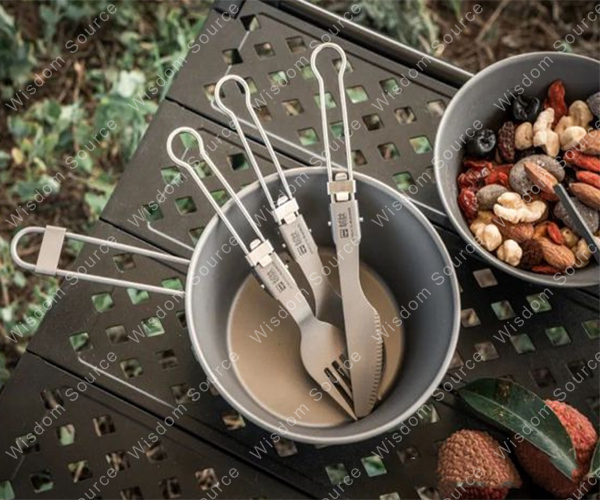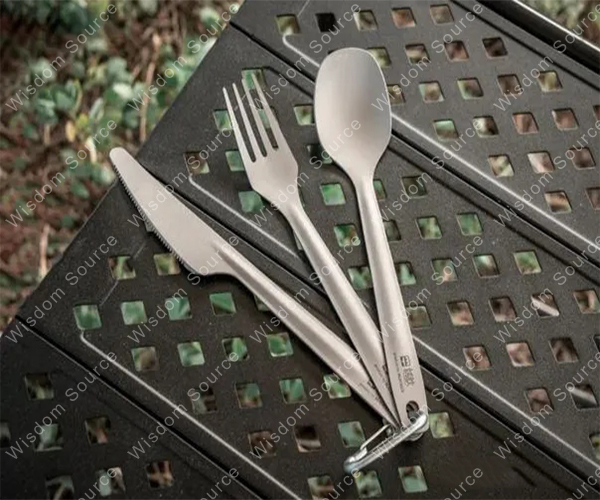Analysis Of Safety Application Of Titanium In Food And Cooking Utensils
Analysis Of Safety Application Of Titanium In Food And Cooking Utensils
Titanium is a metal that is more and more widely used in food and pots and pans. Generally speaking, titanium is relatively safe under certain conditions.
1. The characteristics of titanium
1) Chemical Stability
Titanium has extremely high chemical stability. At room temperature, a dense oxide film will form on the surface of titanium. This oxide film is very stable and can effectively prevent chemical reactions between titanium and other substances. This makes titanium not corrode or dissolve harmful substances as easily as some metals when it comes into contact with food. For example, iron is easy to rust in humid environments, while titanium can maintain good stability even in highly corrosive environments such as seawater. This characteristic allows pots and pans made of titanium to be used to cook a variety of acidic, alkaline or salt-containing foods without being corroded.
2) Biocompatible
Titanium has good biocompatibility. This means that when titanium comes into contact with human tissues, it will not cause allergies, inflammation or other adverse reactions. In the medical field, titanium is widely used in the production of artificial joints, dental implants and other medical devices precisely because of its good biocompatibility. Similarly, when titanium is used in food contact materials, its biocompatibility also makes it relatively safe. When the human body ingests a small amount of substances from titanium products, it is unlikely to cause health problems.

2. Safety of application in food and pots and utensils
1) Food Additives
In the food industry, titanium is sometimes used as a food additive, mainly in the form of titanium dioxide. Titanium dioxide is usually used as a white pigment to increase the whiteness and opacity of food. At present, food regulatory agencies have strict regulations on the use of titanium dioxide in food. Within the prescribed dosage range, titanium dioxide is considered relatively safe. However, in recent years, some studies have questioned the safety of titanium dioxide. Studies have shown that nano-scale titanium dioxide may pose potential risks to human health, such as causing inflammation or affecting the intestinal microbial community. But these studies are still in the preliminary stage, and more evidence is needed to determine their true impact on human health.
2) Pots And Pans
Pots and utensils made of titanium have many advantages.
First of all, the titanium pot is light in weight, high in strength, and not easy to deform.
Secondly, titanium pots have good thermal conductivity and can heat food quickly and evenly.
In addition, the titanium pot also has the characteristics of corrosion resistance, not easy to stick to the pot, etc., and is easy to clean and maintain.
From a safety point of view, titanium pots are safe under normal use conditions. Titanium will not react chemically with food and will not release harmful substances. However, if the titanium pot is over-heated, scratched or damaged during use, it may cause the oxide film on the surface of the titanium to be destroyed, thereby increasing the risk of titanium coming into contact with food. In addition, if used improperly, such as cooking strong acid and alkali foods in a titanium pot or storing food for a long time, it may also affect the safety of the titanium pot.

3. Potential Risks and Precautions
1) Potential Risks
Although titanium is relatively safe under normal circumstances, there are still some potential risks. As mentioned earlier, nano-scale titanium dioxide may have a potential impact on human health.In addition, titanium products may be contaminated by other substances during the production process. If these pollutants are not fully removed, they may cause harm to human health. In addition, for certain special groups of people, such as those with allergies, they may be allergic to titanium or certain ingredients in titanium products. Although this condition is relatively rare, it is still necessary to pay attention to whether there is an allergic reaction when using titanium products.
2) Precautions
When using titanium products, attention should be paid to choosing products produced by regular manufacturers to ensure that product quality meets relevant standards. At the same time, titanium products should be used and maintained correctly in accordance with the product manual to avoid excessive heating, scratches or damage. For foods containing titanium dioxide, pay attention to the ingredient information on the food label to avoid excessive intake. Especially for special groups such as children, pregnant women and the elderly, food should be selected more carefully.
The application of titanium in food and pots and pans is relatively safe under certain conditions. However, we cannot ignore the potential risks. We should strengthen the supervision and research of titanium products to ensure their safety.At the same time, consumers should also pay attention to choosing regular products when using titanium products, and use and maintain them correctly to reduce potential health risks.
